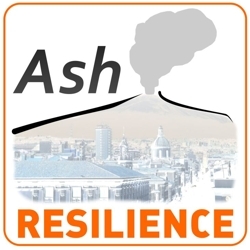Ash-RESILIENCE (RESearch Infrastructure for voLcanIc ash hazard assessment to aviation and communitis living Near Italian active volCanoEs) is a project funded by the “Ministero dell'Istruzione dell'Università e della Ricerca” (MIUR) by the “Fondo ordinario per gli enti e le istituzioni di ricerca” (FOE) for 2015 (see “Nota Prot. n. 850”, at http://www.miur.gov.it/web/guest/-/decreto-riparto-progetti-premiali-foe-2015).
Project start: 16/11/17
Project duration: 2 years
Coordinator: Antonio COSTA
Scientific responsible: Daniele ANDRONICO
Disciplinary field and area of interest
H2020 ERC Disciplinary Field: Physical Science and Engineering (PE)
Specific Area: 10. SMART, SECURE AND INCLUSIVE COMMUNITIES: technological solutions for the realization of innovative models in the integrated management of urban and metropolitan areas.
The term Smart Community means a territorial context where the planned use of human and natural resources, managed and integrated by means of available information and communications technologies (ICT), enables the creation of an ecosystem able to make better use of resources and provide integrated and intelligent services.
Abstract
The objective of the Ash-RESILIENCE project is to strengthen the resilience to tephra fallout from explosive volcanic eruptions of population of the two main metropolitan areas in Italy having active volcanoes within their territory and air space: Catania and Napoli. This goal will be obtained through an integrated system, inspired by Smart Community concept, based on a multidisciplinary approach able to integrate the activity of monitoring and forecasting formation of eruption columns and the transport of the volcanic clouds in the atmosphere, together with the management of the criticalities related to the impact in the two metropolitan areas. The metropolitan areas of Catania and Naples are two densely inhabited cities with almost a million and more than three (Catania 1.115.535 and Naples 3.110.979, www.wikipedia.com) millions of people, respectively. Moreover, they host two very busy international airports (Fontanarossa and Capodichino) which are in the top ten of the most busy Italian airports with >7 and >6 millions of passengers each year and a strategic Naval Air Station in the Mediterranean checkerboard (Sigonella). Tephra injection in the atmosphere and its fallout on the ground can dramatically increase the problems related to the ordinary airport operations as well as the road mobility. By means of the integration of state-of-the-art instrumentations and models, Ash-RESILIENCE aims to provide technological and computational tools to improve the management of the crises related to tephra dispersal and to promote a different perception of the way of living with volcanoes and a correct use of the territory before, during and after eruptions, of which aviation and people living in the metropolitan areas will benefit. The latter represents a fundamental step in increasing our country's resilience to the impact of explosive volcanic activity.
Keywords
Volcanic ash, natural hazards, aviation safety, volcanic processes simulation, data assimilation, ICT, Smart Community, Etna, Vesuvio, Campi Flegrei.

